

In praise of Tesla’s bankruptcy – TechCrunch. You know everybody loves Tesla-the-company.
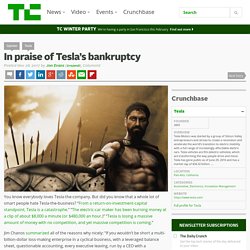
Tesla’s patent strategy opens the road to sustainability for transport and for itself. Craig Buschmann Contributor Craig Buschmann is an intellectual property attorney at Brinks Gilson & Lione.
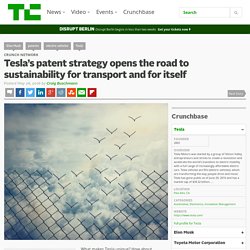
What makes Tesla unique? How about everything. Mention patents to most people and their eyes glaze over. Can We Escape Consumerism? Libertarian socialism - Wikipedia. Libertarian socialism (or socialist libertarianism)[1] is a group of anti-authoritarian[2] political philosophies inside the socialist movement that rejects socialism as centralized state ownership and control of the economy.[3] Past and present political philosophies and movements commonly described as libertarian socialist include anarchism as well as autonomism, Communalism, participism, guild socialism,[27] revolutionary syndicalism and libertarian Marxist[28] philosophies such as council communism[29] and Luxemburgism[30] as well as some versions of utopian socialism[31] and individualist anarchism.[32][33][34][35] Overview[edit] Libertarian socialism is a Western philosophy with diverse interpretations, though some general commonalities can be found in its many incarnations.
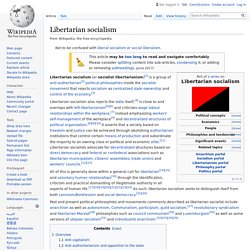
Noam Chomsky is one of the most well-known contemporary libertarian socialist thinkers Anti-capitalism[edit] John O`Neil argues: An Economy Based On Consumerism Is Not Sustainable. It’s time to face the brutal facts.
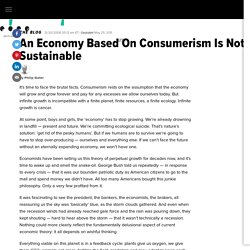
Consumerism rests on the assumption that the economy will grow and grow forever and pay for any excesses we allow ourselves today. But infinite growth is incompatible with a finite planet, finite resources, a finite ecology. Infinite growth is cancer. At some point, boys and girls, the ‘economy’ has to stop growing. Rethinking Money: How New Currencies Turn Scarcity into Prosperity: Bernard Lietaer, Jacqui Dunne: 9781609942960: Amazon.com: Books. The driverless truck is coming, and it’s going to automate millions of jobs. A convoy of self-driving trucks recently drove across Europe and arrived at the Port of Rotterdam.

No technology will automate away more jobs — or drive more economic efficiency — than the driverless truck. Shipping a full truckload from L.A. to New York costs around $4,500 today, with labor representing 75 percent of that cost. But those labor savings aren’t the only gains to be had from the adoption of driverless trucks. Where drivers are restricted by law from driving more than 11 hours per day without taking an 8-hour break, a driverless truck can drive nearly 24 hours per day. That means the technology would effectively double the output of the U.S. transportation network at 25 percent of the cost. And the savings become even more significant when you account for fuel efficiency gains.
CAMPUS LIFE - Wisconsin - Planning Circle of Cities To Aid the Environment. MADISON, Wis.— A professor of landscape architecture at the University of Wisconsin at Madison not only has a design for the urban future but is planning a way to make it come true as well.
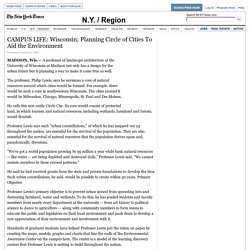
The professor, Philip Lewis, says he envisions a core of natural resources around which cities would be formed. For example, there would be such a core in southwestern Wisconsin. The cities around it would be Milwaukee, Chicago, Minneapolis, St. Paul and Des Moines. He calls this new entity Circle City. We could colonize the moon at an initial cost of only $10 billion.
(Updates article to add other costs of colonizing the moon.)
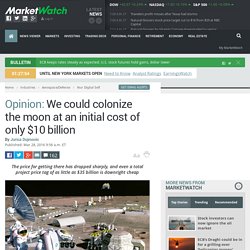
What if I told you there’s no reason we couldn’t set up a small base on the moon by 2022 without breaking the bank? Reaching the moon would cost about $10 billion — estimates range from $7 billion and $13 billion — with an additional $28 billion to $52 billion being spent on the construction of base-related structures. That is considerably less than a previous price of $100 billion-plus when technology was less advanced and more expensive.
To put that cost in perspective, one U.S. aircraft carrier has a price of $13 billion. Some of the greatest scientists and professionals in the space business already have a plan. Returns to scale. There are three possible types of returns to scale: increasing returns to scale, constant returns to scale, and diminishing (or decreasing) returns to scale.
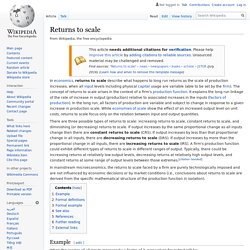
If output increases by the same proportional change as all inputs change then there are constant returns to scale (CRS). If output increases by less than that proportional change in all inputs, there are decreasing returns to scale (DRS). If output increases by more than the proportional change in all inputs, there are increasing returns to scale (IRS). A firm's production function could exhibit different types of returns to scale in different ranges of output. Typically, there could be increasing returns at relatively low output levels, decreasing returns at relatively high output levels, and constant returns at some range of output levels between those extremes.
Deep Learning Is Going to Teach Us All the Lesson of Our Lives: Jobs Are for Machines — Basic income. Deep Learning Is Going to Teach Us All the Lesson of Our Lives: Jobs Are for Machines (An alternate version of this article was originally published in the Boston Globe) On December 2nd, 1942, a team of scientists led by Enrico Fermi came back from lunch and watched as humanity created the first self-sustaining nuclear reaction inside a pile of bricks and wood underneath a football field at the University of Chicago.

Returns to scale. Busy States of America. 75,343,469 people will wake up in the next hour.
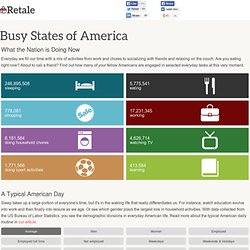
People spend an extra 12 minutes eating and drinking on weekends and holidays. Average time spent shopping is 45 mins per day. Parkinson's law. UK First edition book cover Originally, Parkinson's law is the adage that "work expands so as to fill the time available for its completion", and the title of a book which made it well-known. However, in current understanding, Parkinson's law is a reference to the self-satisfying uncontrolled growth of the bureaucratic apparatus in an organization. History[edit] E. F. Schumacher. Ernst Friedrich "Fritz" Schumacher (16 August 1911 – 4 September 1977) was an internationally influential economic thinker, statistician and economist in Britain, serving as Chief Economic Advisor to the UK National Coal Board for two decades.[1] His ideas became popularized in much of the English-speaking world during the 1970s.
Buddhist economics. Buddhist economics is a spiritual approach to economics.[1] It examines the psychology of the human mind and the anxiety, aspirations, and emotions that direct economic activity. A Buddhist understanding of economics aims to clear the confusion about what is harmful and beneficial in the range of human activities involving production and consumption, and ultimately tries to make human beings ethically mature.[2] It tries to find a middle way between a purely mundane society and an immobile conventional society.[3] It says that truly rational decisions can only be made when we understand what creates irrationality.
When people understand what constitutes desire, they realize that all the wealth in the world cannot satisfy it. When people understand the universality of fear, they become more compassionate to all beings. Thus, this spiritual approach to Economics doesn't rely on theories and models but on the essential forces of acumen, empathy, and restraint.[2] History[edit] See also[edit]